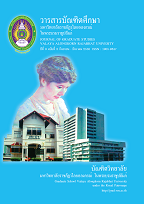การพัฒนาการคิดวิจารณญาณด้วยการเรียนแบบกรณีศึกษาบนเว็บ ที่ใช้เทคนิคการตั้งคำถามและการคิดสะท้อน ENHANCING CRITICAL THINKING WITH CASE-BASED LEARNING ON WEB USING QUESTIONING TECHNIQUES AND REFLECTIVE THINKING
Main Article Content
Abstract
บทคัดย่อ
การวิจัยนี้มีวัตถุประสงค์เพื่อศึกษาผลของการเรียนด้วยกรณีศึกษาบนเว็บที่ใช้เทคนิคการตั้งคำถามและการคิดสะท้อนที่มีต่อการคิดวิจารณญาณของนักศึกษาระดับปริญญาตรี ตัวแปรที่ศึกษาคือ เทคนิคการตั้งคำถาม 2 แบบ ได้แก่การตั้งคำถามแบบโสเครติส และแบบ 5W1H และวิธีการคิดสะท้อน 2 แบบ ได้แก่ วิธีการคิดสะท้อนแบบการเล่าเรื่องด้วยดิจิทัล และวิธีการคิดสะท้อนแบบความเรียง กลุ่มตัวอย่าง คือนักศึกษาระดับปริญญาตรี จำนวน 83 คน แบ่งเป็น 4 กลุ่ม เครื่องมือที่ใช้ในการวิจัย ได้แก่ 1) แผนการจัดการเรียนรู้ด้วยกรณีศึกษาบนเว็บ 2) เว็บไซต์การเรียนด้วยกรณีศึกษาที่ใช้เทคนิคการตั้งคำถามและการคิดสะท้อน และ 3) แบบวัดการคิดวิจารณญาณ Cornell Critical Thinking Test level Z การวิเคราะห์ข้อมูลใช้วิธีการวิเคราะห์เนื้อหา และสถิติที่ใช้คือ ค่าเฉลี่ย
ค่าเบี่ยงเบนมาตรฐาน การวิเคราะห์ความแปรปรวนทางเดียว และการวิเคราะห์ความแปรปรวนสองทาง
ผลการวิจัย พบว่า
1. นักศึกษาที่เรียนด้วยกรณีศึกษาบนเว็บที่ใช้เทคนิคการตั้งคำถามต่างกัน มีการคิดวิจารณญาณไม่แตกต่างกันอย่างมีนัยสำคัญทางสถิติที่ระดับ .05
2. นักศึกษาที่เรียนด้วยกรณีศึกษาบนเว็บที่ใช้วิธีการคิดสะท้อนต่างกัน มีการคิดวิจารณญาณแตกต่างกันอย่างมีนัยสำคัญทางสถิติที่ระดับ .05
ABSTRACT
The purpose of this research was to study the effects of case-based learning on web using questioning techniques and reflective thinking upon critical thinking of undergraduate students. This study used an experiment research design. Treatment variables were : 1) two types of questioning techniques: Socratic question technique and 5W1H question technique and 2) two types reflective thinking methods: Digital storytelling and Essay. The samples were 83 undergraduate students and were divided into four groups. The research instruments were : 1) Lesson plans, 2) Case-Based Learning on web using question techniques and reflective thinking, and 3) Cornell Critical Thinking Test level. Data were analyzed using content analysis, mean (), standard deviation (S.D.), One-way ANOVA and Two-way ANOVA.
The research findings were:
1. The students studied with case-based learning on web using different questioning techniques had no difference on critical thinking score at the .05 level of significance.
2. The students studied with case-based learning on web using different reflective thinking methods had difference on critical thinking score at the .05 level of significance.Article Details

This work is licensed under a Creative Commons Attribution-NonCommercial-NoDerivatives 4.0 International License.
บทความทุกเรื่องได้รับการตรวจความถูกต้องทางวิชาการโดยผู้ทรงคุณวุฒิ ทรรศนะและข้อคิดเห็นในบทความ Journal of Global of Perspectives in Humanities and Social Sciences (J-GPHSS) มิใช่เป็นทรรศนะและความคิดของผู้จัดทำจึงมิใช่ความรับผิดชอบของบัณฑิตวิทยาลัย มหาวิทยาลัยราชภัฏวไลยอลงกรณ์ ในพระบรมราชูปถัมภ์ กองบรรณาธิการไม่สงวนสิทธิ์การคัดลอก แต่ให้อ้างอิงแหล่งที่มา


